|
|
|
Sort Order |
|
|
|
Items / Page
|
|
|
|
|
|
|
| Srl | Item |
| 1 |
ID:
181588
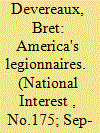

|
|
|
|
|
| Summary/Abstract |
Much like modern defenders of the All-Volunteer Force, the Romans seem to have thought that their professional army could be scaled up in an emergency and that the threat to civilian control could be managed. Neither turned out to be true.
|
|
|
|
|
|
|
|
|
|
|
|
|
|
|
|
| 2 |
ID:
181733
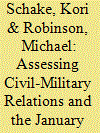

|
|
|
|
|
| Summary/Abstract |
The events of January 6, 2021, when violent rioters attacked the Capitol building in Washington in order to disrupt validation of the 2020 presidential election, forced an unprecedented reckoning with the state of American politics. Members of Congress struggled to account for the rhetoric that gave rise to the event; law enforcement grappled with the challenge of holding accountable those who perpetrated the violence; and journalistic outlets wrestled with reporting a complex web of conspiracy theories and disinformation that gave rise to the insurrection. But for senior military leaders, the question was how to explain the troubling presence of active duty servicemembers and veterans in the first attack on the American seat of government in two centuries. The result is a profound and urgent discussion in U.S. civil-military relations.
|
|
|
|
|
|
|
|
|
|
|
|
|
|
|
|
| 3 |
ID:
152710
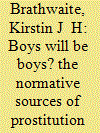

|
|
|
|
|
| Summary/Abstract |
How do militaries decide policies regarding sex and sexual behavior? Are policies based on expert knowledge and correlated to military effectiveness? Is civilian intervention important in crafting military policies? This paper focuses on one specific type of military policy—that governing prostitution. It asks why militaries adopt particular policies regarding the use of prostitutes by their members. Examining two cases of professional militaries at war—Germany and the United States during World War II—it argues that professional military leaders came to different positions on prostitution based on intersecting gender, racial, and political norms in civilian society. The two militaries differed on policy not due to civilian intervention but rather as a result of different assessments of the influence of prostitution on military effectiveness. Those assessments of effectiveness were informed by the racial, gender, and political norms that permeated all of society, including the military.
|
|
|
|
|
|
|
|
|
|
|
|
|
|
|
|
| 4 |
ID:
189929


|
|
|
|
|
| Summary/Abstract |
The civil-military relations literature on Turkey focuses predominantly on the guardianship role of the Turkish military, its interventions, and the role of the National Security Council as the main institutional mechanism of military tutelage. Yet, the existing studies lack a much-needed focus on the law enforcement or policing missions of the Turkish military. To fill this gap, this study discusses the EMASYA Protocol (Emniyet Asayiş Yardımlaşma or Security and Public Order Assistance), a secret protocol signed in 1997. Emerging in the context of political instability and military tutelage of the 1990s, the Protocol enabled the military to conduct internal security operations without permission from the civilian authorities. This paper argues that the EMASYA Protocol provided a sphere of “reformulated new professionalism” for the Turkish military, enabled it to specialize in the war against rising internal threats such as reactionary Islam and Kurdish separatism, and created anomalies in civil-military relations in Turkey.
|
|
|
|
|
|
|
|
|
|
|
|
|
|
|
|
| 5 |
ID:
143076
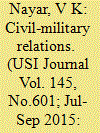

|
|
|
| 6 |
ID:
172629
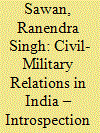

|
|
|
|
|
| Summary/Abstract |
This year’s winning essay examines civil-military relations (CMR) in a historical perspective, leading up to its present status. The essay also identifies crucial areas of civil-military dissonance – both from a military as well as civilian perspective, while critically examining the measures proposed for reformation of higher defence management and strengthening CMR. It prescribes reforms in CMR could be most effectively implemented by a ‘Top-Down Approach’. However, the author proposes a more pragmatic ‘Lateral or Indirect Approach’. It also suggests means of strengthening CMR further in the interest of the nation.
|
|
|
|
|
|
|
|
|
|
|
|
|
|
|
|
| 7 |
ID:
147812
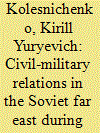

|
|
|
|
|
| Summary/Abstract |
Primorksy Krai, in Russia’s Far East, provides a perfect example of the extreme need of cooperation between civil and military authorities during critical periods of conflict and potential wars. Ensuring this region’s defense capability and providing for the needed manpower for agriculture and needed industries resulted from the cooperation of civil and military authorities. This article is based on documents and materials researched in five Russian archives.
|
|
|
|
|
|
|
|
|
|
|
|
|
|
|
|
| 8 |
ID:
163093
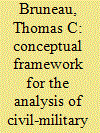

|
|
|
|
|
| Summary/Abstract |
The article argues that current conceptual approaches in civil-military relations are deeply flawed resulting in its irrelevance in analyzing major issues including war and the collapse of democracy. After highlighting major flaws in the work of the late Samuel Huntington and those who follow his approach, the article argues that other conceptual approaches, including Security Sector Reform, are also flawed, or in the case of the “military effectiveness” literature, largely irrelevant. In explaining the main causes of the flawed conceptual literature, the article highlights the absence of good data and challenges in methodology. While arguing that military forces are very unlikely to engage in armed combat, it highlights the roles and missions which in the world today are implanted by these forces. As it is virtually impossible to prove effectiveness of the armed forces in these roles and missions, the article proposes a conceptual approach based on requirements.
|
|
|
|
|
|
|
|
|
|
|
|
|
|
|
|
| 9 |
ID:
177661
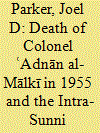

|
|
|
|
|
| Summary/Abstract |
This article reconsiders the simple minority-majority dichotomy that surrounded the death of Colonel ʿAdnān al-Mālkī who was a Sunni killed by an ʿAlawi in 1955. Nevertheless, it was not the ʿAlawi minority, or other non-Sunni minorities that drove the subsequent power struggle that arose in Syria. Rather what occurred was a battle for control of the identity, direction, and economic organization of the young state contested by two alternative networks of Sunni elites, namely ʿulemaʾ (religious-scholarly) families, and ʿaskerī (military-administrative) families, both of whose social origins can be found in Ottoman history. This study argues that al-Mālkī’s assassination temporarily weakened the Syrian ʿulemaʾ families’ position in the civil-military balance that undergirded Syrian society and allowed the ʿaskerī class to gain the initiative. Such a change is evidenced by Damascus’s turn toward the Soviet Union for arms as well as other state-building materials. The inability of these two competing internal networks to resolve their differences throughout the Cold War resulted in political dysfunction throughout the Cold War era. The ascent of Gamal ʿAbd al-Nasser to power with the creation of the United Arab Republic in 1958 proved a temporary abeyance in this struggle, but a final resolution came only much later when Hafez al-Assad became leader in 1970.
|
|
|
|
|
|
|
|
|
|
|
|
|
|
|
|
| 10 |
ID:
183893
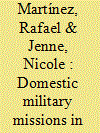

|
|
|
|
|
| Summary/Abstract |
Latin American militaries are today in many regards inoperative and obsolete as an instrument of defence. Yet, they seek to maintain their organisational power and privileges. Governments, on the other hand, lack the adequate means to fight criminality, persisting poverty and social inequality. In an apparent win-win situation, Latin American governments have used the military as a wildcard to step in where civilian state capacity falls short, including for urban and border patrols, literacy campaigns and to collect garbage, among many other tasks. The military's manifold internal use has been defended mainly based on pragmatic reasons. We argue instead that the ostensive pareto optimality between militaries and governments has had negative effects for civil-military relations from a democratic governance point of view that takes into consideration the efficiency and effectiveness of how the state delivers basic services across different policy areas.
|
|
|
|
|
|
|
|
|
|
|
|
|
|
|
|
| 11 |
ID:
173637
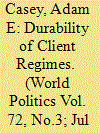

|
|
|
|
|
| Summary/Abstract |
Conventional wisdom holds that great power patrons prop up client dictatorships. But this is generally assumed rather than systematically analyzed. This article provides the first comprehensive analysis of the relationship between foreign sponsorship and authoritarian regime survival, using an original data set of all autocratic client regimes in the postwar period. The results demonstrate that patronage from Western powers—the United States, France, and the United Kingdom—is not associated with client regime survival. Rather, it’s only Soviet sponsorship that reduced the risk of regime collapse. The author explains this variation by considering the effects of foreign sponsorship on the likelihood of military coups d’état. He argues that the Soviet Union directly aided its clients by imposing a series of highly effective coup prevention strategies. By contrast, the US and its allies didn’t provide such aid, leaving regimes vulnerable to military overthrow.
|
|
|
|
|
|
|
|
|
|
|
|
|
|
|
|
| 12 |
ID:
185518
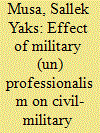

|
|
|
|
|
| Summary/Abstract |
The focus of this study is on the effect of military (un)professionalism on civil-military relations and citizens’ security in Nigeria. To sketch the context, the article provides a brief background on the nature of armed conflict, which necessitated the deployment of the military in internal operations. Following this is a brief description of the extent and nature of military abuse, which strains civil-military relations. Using the principles of what constitutes military professionalism, the study shows that the conduct of the Nigerian military, together with the lack of civil control undermines internal security operations and has eroded trust in the armed forces. The influence on civil-military relations is analysed, with reference to a qualitative study conducted among civilians affected by military abuse in Plateau State. The findings show that the unprofessionalism of the Nigerian military undermines military effectiveness, civil-military relations, and exacerbates the insecurity of citizens.
|
|
|
|
|
|
|
|
|
|
|
|
|
|
|
|
| 13 |
ID:
172858
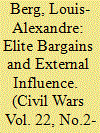

|
|
|
|
|
| Summary/Abstract |
This article explores how elite bargains affect external influence over civil-military relations. It argues that opportunities for security assistance arise from fragmented post-war coalitions and negotiations among rival factions. In post-civil war Liberia and Sierra Leone, the role of security assistance reflected bargains struck by ruling elites to consolidate their authority. Politicians used external backing to maintain fragmented coalitions while neutralising threats from factionalised armed forces. Reliance on security assistance enabled external influence through conditioning aid, delegated control, and day-to-day interaction. These cases highlight the importance of examining internal politics to explain the effects of security assistance.
|
|
|
|
|
|
|
|
|
|
|
|
|
|
|
|
| 14 |
ID:
183896
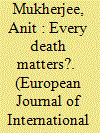

|
|
|
|
|
| Summary/Abstract |
How do combat missions, defined as an armed confrontation that causes casualties, shape civil-military relations and military’s role conception? This article argues that militaries that incur combat casualties gain a stronger hand in the civil-military equilibrium. This is because casualties affect domestic political opinion and give prominence to the views expressed by military officials. Civilians are then more deferential to professional military advice. In turn, the military obtains considerable operational freedom, and can pick and choose missions which they find desirable. Second, the military’s role conception – an important determinant of military missions, is shaped most prominently by its combat experience. Militaries sustaining casualties obtain leverage vis-à-vis civilians and based on their institutional preference, they either prioritise or avoid non-traditional missions. While making these arguments, this article examines combat casualties, role conception, and civilian control in India. These concepts as a whole and, the Indian case study especially are surprisingly understudied considering it is among the few non-Western democracies with firm civilian control, a record of overseas intervention operations and a military with varying roles and missions. Analysing India’s experience therefore adds to the literature and illuminates the mechanism through which casualties affect civil-military relations.
|
|
|
|
|
|
|
|
|
|
|
|
|
|
|
|
| 15 |
ID:
147391
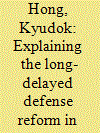

|
|
|
|
|
| Summary/Abstract |
This study explains why defense reform efforts in South Korea have failed to achieve substantial progress. The outcome would seem all the more unexpected because the Blue House has ostensibly wanted comprehensive defense reform, while the Korean military is also highly motivated to upgrade itself to be able to fight and defend itself against North Korea, which has continuously threatened to use nuclear weapons preemptively. How should we account for this puzzle? This study focuses on three factors to explain the absence of reform: the role of the president, the opposition from the armed forces leadership, and lapses in the civilian control of the military. This study concludes that South Korea needs to revitalize the reform process in order to successfully confront the security challenges of the twenty-first century. Defense reform has long been dominated by the military leaders. It has resulted in the unwanted situation where civilian leaders have been alienated. Ironically, lack of interest among civilian leaders leads to the lack of support from outside. In order to achieve successful defense reform, assistance from the outside must be guaranteed. South Korea needs to readjust goals and prepare for building robust armed forces to play a decisive role in achieving the mission to meet the requirements of changing strategic environments. The Park administration also needs to take timely steps to overcome its own vulnerabilities, such as modifying its doctrine, equipment, training, and culture. Elimination of its vulnerabilities may involve changes in philosophy, tactics and possibly even modifications to the concepts of operations. All can entail substantial costs. However, the cost of not dealing with the threats is likely to be much higher.
|
|
|
|
|
|
|
|
|
|
|
|
|
|
|
|
| 16 |
ID:
167176
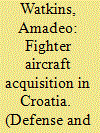

|
|
|
|
|
| Summary/Abstract |
The possibility for Croatia to obtain new fighter aircraft is not new, as this option has been publicly debated for at least a decade. A sudden decision to advance the acquisition of a limited number of fighter aircraft was made in 2017 with an international tendering process concluding in early 2018. Through open source material, this paper will look at this procurement process by examining the relationship between policy and strategic thinking on the one side, and policy delivery on the other, and evaluate why the tendering process failed in achieving envisaged results. The paper concludes that the problems facing the Croatian aircraft acquisition process stem from at least two interrelated factors: firstly, at the operational level, the failure of the procurement was the direct result of mismanaged tendering procedures linked to the wider public administration reform process; and secondly, at the strategic level, inherently complex civil-military relations and related cultural aspects which have not been adequately addressed over the past decades. The result was a failure to deliver on government policy, something which this paper argues will need to be addressed over the medium to long term.
|
|
|
|
|
|
|
|
|
|
|
|
|
|
|
|
| 17 |
ID:
151423
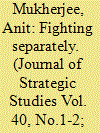

|
|
|
|
|
| Summary/Abstract |
How do countries transition from single service to joint operations? This article engages with the discussion on military innovation to argue that civil–military relations are the most important driver for jointness. In doing so it examines jointness in the Indian military. Relying on archival research and primary interviews this article sheds new light on the operations of the Indian Peacekeeping Forces (IPKF) in Sri Lanka from 1987–1990, the 1999 Kargil War and the Post-Kargil defence reforms. The main argument is that the Indian military’s transition to jointness has been ‘incomplete’ primarily because of its prevailing model of civil-military relations. This model prevents civilians from interfering in the operational issues of the military, including on matters pertaining to jointness. It therefore recommends more forceful civilian intervention to overcome the prevailing single service approach.
|
|
|
|
|
|
|
|
|
|
|
|
|
|
|
|
| 18 |
ID:
156544
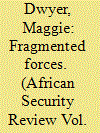

|
|
|
|
|
| Summary/Abstract |
This article provides a detailed look at the history of the Gambia Armed Forces (GAF), a military that has received very little academic attention within the study of African state security forces. It identifies key turning points in the GAF’s history, and highlights the vastly different roles the military played in the state under President Jawara (1965–94) and President Jammeh (1994–2017). Yet, it also highlights important similarities regarding internal patterns within the armed forces and shows the ways in which these continuities may challenge attempts to restructure the security sector. The article draws on archival research and interviews conducted with retired and active duty Gambian military personnel, government officials, and Gambian scholars.
|
|
|
|
|
|
|
|
|
|
|
|
|
|
|
|
| 19 |
ID:
165447
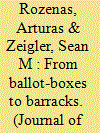

|
|
|
|
|
| Summary/Abstract |
The military often intervenes in politics shortly after elections. This might be because election results reveal information about the ease with which a coup can succeed. Would-be coup perpetrators use this information to infer whether the incumbent can be removed from office without provoking popular unrest. We argue that the informational content of elections depends on the electoral rules that translate votes into outcomes. In electoral systems that incentivize strategic voting, election returns are less informative about the distribution of political support than in electoral systems that incentivize sincere voting. An extensive battery of statistical tests shows that vote-shares of election winners do not predict coup attempts in plurality systems, which encourage strategic voting, but they do predict coup attempts in non-plurality electoral systems, which do not encourage strategic voting. Thus, incumbents who have performed well in elections face a lower risk of coup attempts, but only in institutional environments where voting results are highly informative about the distribution of political support. We apply this logic to illuminate the decisions of the military to intervene into politics during the famous failed 1936 coup in Spain and the successful 1973 coup in Chile.
|
|
|
|
|
|
|
|
|
|
|
|
|
|
|
|
| 20 |
ID:
166591
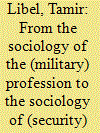

|
|
|
|
|
| Summary/Abstract |
Few would disagree that European militaries have experienced dramatic changes since the end of the Cold War. Much of the discussion on these changes to date has referred to the concept of professionalism. However, this approach became outdated as professions in post-industrialist societies entered a state of crisis as a result of growing competition from a variety of competitors. The present study adapts a new framework from the sociology of knowledge literature – sociology of expertise – into one, sociology of security expertise, which is suitable for study of contemporary armed forces. Its utility is demonstrated through analysis of five European professional military education institutions. The analysis shows that European military organisations are transiting, albeit in various degrees, from one form of social organisation of military knowledge production – associated with the military education model common to traditional military colleges – toward another, which is related to the military education model of national defence universities. Hence it is highly probable that European military organisations lose, either voluntary or unintentionally, their professional character and can no longer be unquestionably assumed to be military professions. Hence, they should be analysed hereafter using the sociology of security expertise framework.
|
|
|
|
|
|
|
|
|
|
|
|
|
|
|
|
|
|
|
|
|